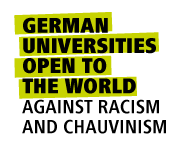
Newsarchiv: Creating knowledge since 1502
Jahr 2020
Land use change disrupts wild plant pollination on a global scale
Human changes to the environment have been linked to widespread pollinator declines. New research published in Nature Communications shows that intensive land use will further decrease pollination and reproductive success of wild plants, especially of those plants that are highly specialized in their pollination. An international team of scientists led by researches from the German Centre for Integrative Biodiversity Research (iDiv), Martin Luther University Halle-Wittenberg (MLU) and the Helmholtz Centre for Environmental Research (UFZ) performed a global data analysis that provided conclusive evidence of the links of human land use and pollination of plants.
Lichtwirbel ermöglichen neuen Blick in die Quantenwelt
Eine neue Methode ermöglicht es, mit Hilfe von Lichtwirbeln bislang unsichtbare Quantenzustände von Elektronen zu beobachten. Entwickelt wurde sie von Physikern der Universität Halle und einem internationalen Forschungsteam. Die Methode verspricht neue Erkenntnisse über die Elektronenbewegung, die für Materialeigenschaften wie elektrische Leitfähigkeit, Magnetismus oder molekulare Strukturen entscheidend ist. Der experimentelle Nachweis erfolgte am freien Elektronenlaser FERMI in Italien, die Ergebnisse wurden im Fachmagazin "Nature Photonics" veröffentlicht.
Pädagogik bei Autismus: Uni Halle richtet deutschlandweit erste Vernetzungsstelle ein
Die Universität Halle will Lehrerinnen und Lehrer sowie Lehramtsstudierende noch stärker für die Bedarfe autistischer Menschen sensibilisieren und ausbilden. Hierzu richtet sie eine neue Forschungs- und Vernetzungsstelle ein. Neben neuen Forschungsprojekten auf dem Gebiet soll auch die Kooperation mit anderen internationalen Forschungs- und Vernetzungsstellen vorangetrieben werden. Damit baut die MLU ihr Alleinstellungsmerkmal weiter aus: Hier ist auch die deutschlandweit einzige Professur für Pädagogik im Autismus-Spektrum angesiedelt.
Veränderte Landnutzung verschlechtert Bestäubung von Wildpflanzen
Die intensive Landnutzung durch den Menschen beeinträchtigt weltweit die Bestäubung von Wildpflanzen und deren Fortpflanzungserfolg. Das betrifft insbesondere Pflanzen, die in ihrer Bestäubung hochspezialisiert sind. Zu diesem Schluss kommt eine neue Studie unter Leitung des Deutschen Zentrums für integrative Biodiversitätsforschung (iDiv), der Universität Halle und des Helmholtz-Zentrums für Umweltforschung (UFZ), die in Nature Communications veröffentlicht wurde. Mithilfe eines globalen Datensatzes ist es dem Forschungsteam gelungen, diesem Zusammenhang zu untersuchen.
Thermal storage units that repair themselves
In future, paraffin wax could help to make underground thermal storage units more durable. Such systems are used, for example, to store solar energy over a longer period of time. In a new study, geologists from Martin Luther University Halle-Wittenberg (MLU) investigated the extent to which paraffin wax can be incorporated into the shell of the storage tanks and whether this can prevent heat loss and close fissures. The research team reports on its findings in the journal "PLOS ONE".
Spintronik: Forscher zeigen, wie sich nichtmagnetische Materialien magnetisch machen lassen
Eigentlich nicht-magnetische Oxid-Materialien lassen sich durch ein komplexes Verfahren so verändern, dass sie magnetisch werden. Grundlage für dieses neue Phänomen ist ein kontrolliertes Wachstum der einzelnen Materialschichten Atomlage für Atomlage. Über das unerwartete Ergebnis berichtet ein internationales Forschungsteam unter Beteiligung der Universität Halle in der Fachzeitschrift "Nature Communications".
Smaller habitats worse than expected for biodiversity, study finds
Biodiversity`s ongoing global decline has prompted policies to protect and restore habitats to minimize animal and plant extinctions. However, biodiversity forecasts used to inform these policies are usually based on assumptions of a simple theoretical model describing how the number of species changes with the amount of habitat. A new study published in the journal Nature shows that the application of this theoretical model underestimates how many species go locally extinct when habitats are lost. Scientists from the German Centre for Integrative Biodiversity Research (iDiv), Martin Luther University Halle-Wittenberg (MLU) and the Helmholtz Centre for Environmental Research (UFZ) used data from 123 studies from across the world to set the path for the next generation of biodiversity forecasts in the face of habitat loss and restoration.
Novel test method detects coronavirus in highly diluted gargle samples
Pharmacists at Martin Luther University Halle-Wittenberg (MLU) have succeeded in detecting small amounts of coronavirus SARS-CoV-2 using mass spectrometry. For their investigation, they used gargle solutions of COVID-19 patients. The novel method might supplement conventional tests. It is currently undergoing improvements and might be available as standard diagnostic tool for COVID-19 in the future. Initial results have been published in the "Journal of Proteome Research".
Wärmespeicher, die sich selbst reparieren
Paraffin könnte zukünftig dabei helfen, Wärmespeicher im Boden langlebiger zu machen. Diese werden gebraucht, um zum Beispiel Sonnenenergie über einen längeren Zeitraum zu speichern. Geologen der Universität Halle haben in einer neuen Studie untersucht, inwieweit sich das Paraffin in die Hülle der Speicher einarbeiten lässt und ob dadurch Wärmeverluste verhindert und Risse von selbst verschlossen werden können. Über die Ergebnisse berichtet das Team in der Fachzeitschrift "PLOS ONE".
Protestnote des Akademischen Senats zur Zielvereinbarung 2020-2024
Zur Bewältigung der Folgen der Covid-19-Pandemie wird von den Hochschulen Sachsen-Anhalts verlangt, insgesamt 6 Mio. Euro im Zeitraum von 2022 bis 2024 an das Land abzuführen. Der Akademische Senat der Universität Halle hat in seiner heutigen Sitzung eine deutliche Protestnote an die Landesregierung zum geforderten "Corona-Solidaritätsbeitrag" formuliert.
Schlimmer als gedacht: Rückgang der Artenvielfalt durch Habitatverluste unterschätzt
Mittlerweile ist es auch in der Politik angekommen: Um das Aussterben von Tieren und Pflanzen zu verringern, müssen deren Lebensräume geschützt und wiederhergestellt werden. Doch die entsprechenden politischen Maßnahmen stützen sich oft auf Vorhersagen durch ein einfaches theoretisches Modell, das beschreibt, wie sich die Artenzahl im Verhältnis zum vorhandenen Lebensraum verändert. Eine neue Studie im Fachmagazin "Nature" zeigt nun, dass dieses Standard-Modell unterschätzt, wie viele Arten tatsächlich auf lokaler Ebene aussterben.
Mystery about cause of genetic disease in horses
Warmblood fragile foal syndrome is a severe, usually fatal, genetic disease that manifests itself after birth in affected horses. Due to the defect, the connective tissue is unstable. Under force, for instance, the skin tears from the tissue underneath and the joints can suffer dislocation. A research team from the Universities of Göttingen and the Martin Luther University Halle-Wittenberg (MLU) has now been able to prove that the disease did not stem from the English thoroughbred stallion Dark Ronald XX, which had been the assumption until now. The results have been published in the journal "Animal Genetics".






